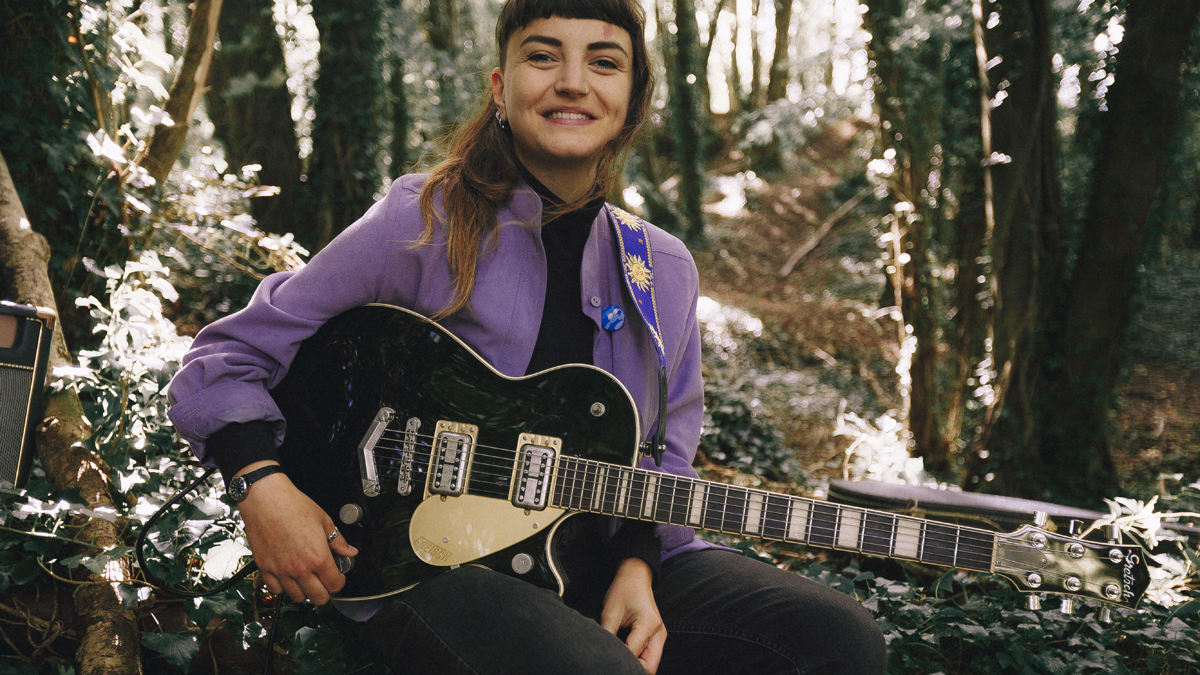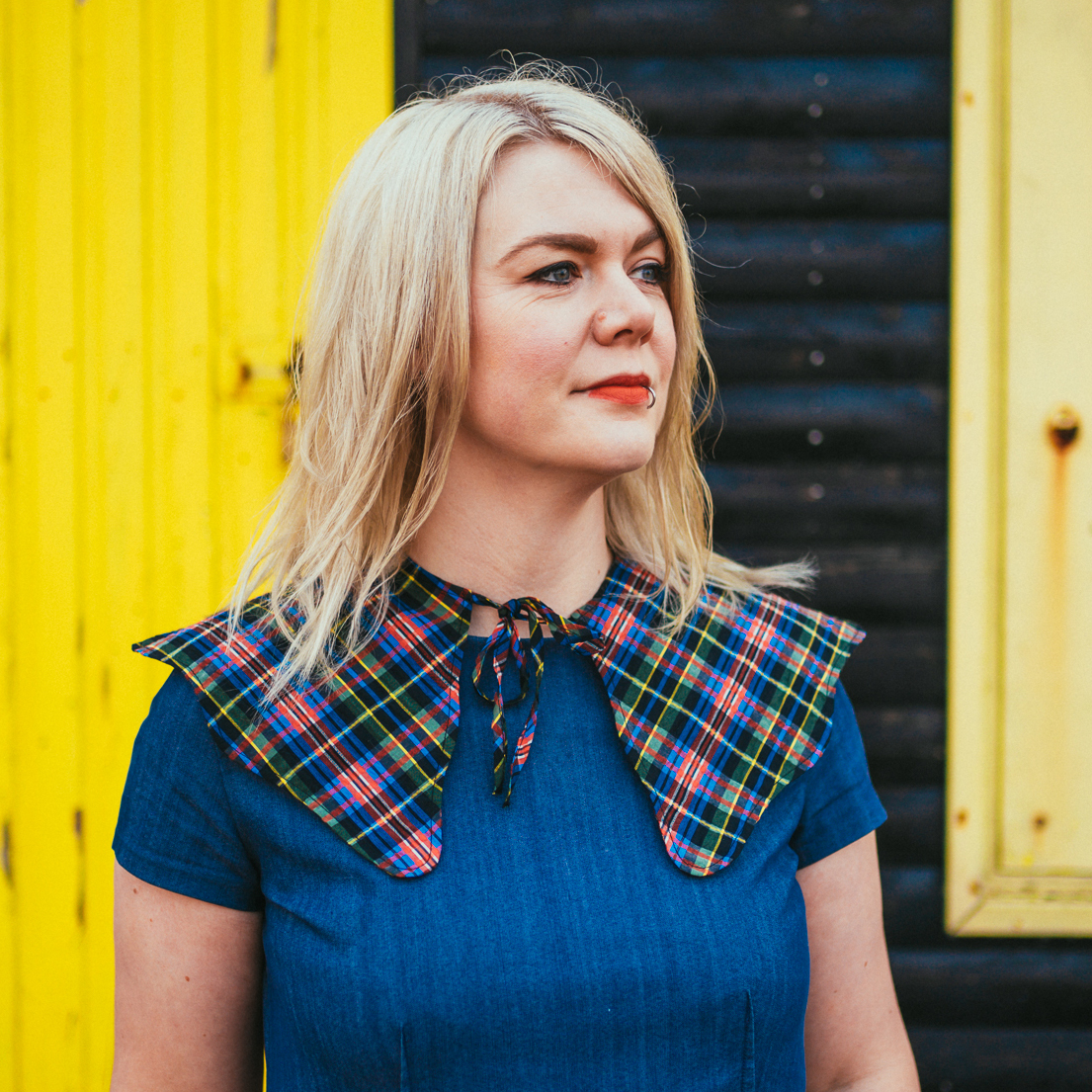Lande Hekt: "With a new project, there's no pressure to sound a certain way"
With her first full-length solo release Going To Hell, Muncie Girls' Lande Hekt is embracing it all, from fingerpicking to the dirty world of folk

If you’ve ever listened to Exeter-based indie trio Muncie Girls, you’ll know that guitarist and songwriter Lande Hekt has always been fairly forthright when it comes to her lyricism. But this full-length solo release isn’t just a confident cuss towards the patriarchy. Going To Hell is an important moment of self-reformation, marking her first release as an outwardly gay person.
Recorded in Australia after a solo tour with friend Ben David of The Hard Aches, the album was captured before lockdown kicked in for the UK during Spring of last year. The acres of eucalyptus trees with koalas bobbing in their branches provided Hekt with a safe space to reflect on coming out and longstanding feelings of isolation, and fear of being herself.
But Going To Hell isn’t the tentative sound of someone soul-searching, rather an intimate interrogation of acceptance and freedom to embrace it all, from finger-picking to the dirty world of folk.
From her home in Bristol, we caught up with the musician to talk about country-leaning lap steel, lo-fi '90s sounds, and letting go of other people’s expectations.
You formed Muncie Girls in your hometown of Exeter as a teenager and since have released two critically acclaimed albums. At what point did the possibility of a solo record present itself?
"Some people start side projects in bands because they're the bass player and they're not writing songs in that band. Whereas in Muncie Girls, it never really felt like I wasn't getting that side of me.
"I put out an EP, Gigantic Disappointment, in 2019 to test the waters and a few people were like 'Yeah, this sort of sounds like Muncie Girls, only maybe not quite as good?’. But then as the themes developed for this record, it made more sense to treat it as a solo record."
All the latest guitar news, interviews, lessons, reviews, deals and more, direct to your inbox!
While you were flanked by Dean and Luke in the band, your debut, Going To Hell, is a far more introspective process and you played all the instruments bar the percussion. Did you change your writing style from creating with Muncie Girls?
"The songs ended up being from a different style because they were less finished. I went into the studio without arranging the instrumentation parts because I was never able to jam with other musicians.
"In Muncie Girls, we demoed everything in the studio and for much longer. Ben and I went folkier with Going To Hell, which in no way is a Muncie Girls vibe. Folk was a dirty word in the band [laughs]."
The songs ended up being from a different style because they were less finished. I went into the studio without arranging the instrumentation parts because I was never able to jam with other musicians
The album was recorded in the Adelaide Hills in Australia with Ben David from The Hard Aches. What gear were you using together in the studio?
"The studio is in Ben’s house, so there's a small live room for acoustic guitars or singing. He moved the sofas out and set the drums up in the living room, and then we set up microphones in the bathroom to try and get some roomier sounds. We recorded all the bass and guitar tracks in the live room. I used a Fender Twin Reverb for most of it. There's a lot of reverb and chorus on this record.
"Guitar-wise, I was going to use a few different guitars – there was a Fender Stratocaster, and I think we had a Gibson as well. In the end, we just used Ben's touring guitar, which is a Philip Kubicki Custom Wildwood Telecaster. We tried loads of different guitars and nothing worked. I wanted to use something Gretsch-like as that's what I'll be using live but, in the end, we went for a Tele because it just worked."
Stranded features some really interesting instrumentation - a warbling organ and country-leaning, lap steel slides. Did this feel like quite a new territory for you?
"Yeah, it was fun to experiment and go a bit off-kilter. As a new project, there's no pressure to sound a certain way. When Muncie Girls put out our second album, the people who had liked the first album wanted it to sound the same but different enough for it to not be the first album again. You can't suddenly put a saxophone on it. Whereas it's fun with my solo project, because no one had any expectations."
80 Days of Rain has driving guitars coupled with a strong palm mute verse channeling indie giants like Ride. How did you build up those layers in the studio to create such a huge sound for one person?
"We had a lot of discussions about the mixing. I was pushing for a more lo-fi '90s sound. But Ben – naturally, as a producer who can mix and get a big sound – wanted to have a rounder sound with more depth. We ended up with a compromise between the two."
It was fun to experiment and go a bit off-kilter. As a new project, there's no pressure to sound a certain way... It's fun with my solo project, because no one had any expectations
"With most of the songs on there, we had an acoustic guitar way up in the mix playing the same. In the song Whiskey, the intro is played on acoustic and electric.
"The Replacements do that a lot. There’s either acoustic washed out with reverb and chorus or distortion with a bit of brightness."
There’s a snaking lead line in December that rings out through the chorus. Did you hear that when you were writing the track, or was that something that came from working over the song in the studio?
"With December, I originally had a completely different lead line that went along in the verse when there's no singing. I laid it down in the demo, but with all the percussion it sounded muddy and messy, so that lead line was one that I thought of in the studio. I wanted that song to sound like The Sundays, trying to replicate that rhythmic guitar with straightforward drums."
Winter Coat is a stripped-back, warm-sounding acoustic with intricate finger-picking. Was that a technique that came naturally to you?
"That doesn't come naturally at all to me! When I play guitar, I love just hammering power chords. I'm originally a bass player and played bass in Muncie Girls up until Fixed Ideals. I used to play with my fingers on the bass and then I switched on to a plectrum totally against my natural feelings."
Learning to play different syncopated rhythmic patterns and singing at the same time can be rewarding. Those two rhythms at war with each other, that's not an easy thing to do
"So when I started playing more guitar, I found the whole thing so uncomfortable it made me want to explore finger-picking more. It hasn't been until the last couple of years that I've tried to do more intricate plectrum work.
"With the fingerpicking, it's like, 'Ah, this is so hard.' But learning to play different syncopated rhythmic patterns and singing at the same time can be rewarding. Those two rhythms at war with each other, that's not an easy thing to do. But then when you practice and it becomes second nature, that’s really satisfying."
Going To Hell is out now via Get Better Records.
Cheri Amour is a writer, editor and broadcaster intent on amplifying the voices of women and non-binary artists in print, online and on air. During her twenties, she played lead guitar in a touring two-piece, sharing the stage with The Slits and John Peel-approved punks The Nightingales. Formerly Deputy Editor at TGA Magazine, Cheri headed up its Tech section pouring over pedals with everyone to indie icon Debbie Smith (Echobelly/Curve) to multi-instrumentalist Katie Harkin (Sleater Kinney/Waxahatchee/Wye Oak). She's currently working on an upcoming 33 1/3 book on the unassuming influence of South Bronx sister troupe ESG, out in Spring 2023.

